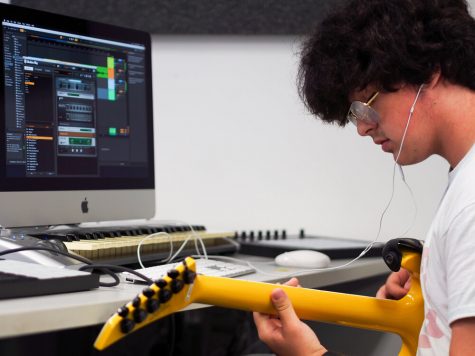High school students will experience Summer at Columbia online
June 9, 2020

Virtual field trips, meeting experts over video calls and screen-sharing with professors—the hallmarks of online college are coming to the Summer at Columbia high school immersion program, which will take place entirely online this year due to campus closures.
The program is built around college freshman-level, three-credit courses designed for students entering their junior or senior year of high school, said Robert Tenges, assistant provost of Continuing and Community Education.
Students normally stay at the University Center and take classes on Columbia’s campus for a three-week, immersive experience. However, because of the coronavirus pandemic, the program has shifted to offer students six-week courses online instead.
Six courses will be available beginning June 29, covering topics like investigative reporting, illustration and music production, and students will earn three credit hours upon completing the program.
Tenges said classes taught by Columbia faculty will be both synchronous, taking place in real time over Zoom, and asynchronous with homework assignments on Canvas.
“Because of the COVID-19 situation, out of the interest of students’ safety, it would not have been responsible for us to do the program [on-campus],” Tenges said.
Tenges said tuition for the program is lower because students will not need on-campus housing or meals. In 2019, the program cost $4,700 for residents with a meal plan, and the base tuition for non-residents was $3,050. This year, the online program costs $1,500.
Typically, Tenges said nearly half of the eligible high school students who participate in the Summer at Columbia immersion program end up attending Columbia. Many of the students who participate in the program are already interested in attending Columbia, but Tenges said it is also a recruitment tool for the college.
Online learning is not new to high school students, said Alex Damarjian, an assistant professor in the Interactive Arts and Media Department.
He said Columbia’s subscription to Microsoft Teams will allow him to have video calls with students and assume control of their computers if they get stuck when he teaches “Introduction to Game Development.”
However, the online format means students will not be able to tour off-campus creative spaces, Damarjian said.
Usually, he would have students take field trips to game studios to learn how Columbia alumni and other industry professionals are creating games. Instead, he will share recorded interviews on Canvas and host video conferences with those in the industry.
Students may have more access to experts and facilities virtually, said Suzanne McBride, chair of the Communication Department, because many professionals in creative industries are more accessible via video call.
“The heart of those field trips was meeting the people, interacting with the working professionals, hearing about their experiences and making those connections,” McBride said. “And that can still happen—and will happen—over Zoom.”
Tenges said the expanded six-week structure is less demanding than the former, intensive three-week structure, allowing students who have part-time jobs or other commitments over the summer to participate.
The six-week program will also give students more time to learn about their craft, said Joe Steiff, professor in the Cinema and Television Arts Department.
Steiff will teach “Screenwriting and Production”—similar to online classes already available to Columbia students. He said during the expanded time frame, students will have the opportunity to digest what they are learning and polish their writing.
“I think this summer there is just so much happening,” Steiff said. “My hope is that this class will give students a chance to record their observations of the world, and also really contemplate how these events are affecting them and the people they love, and what they want to offer the world in response.”







